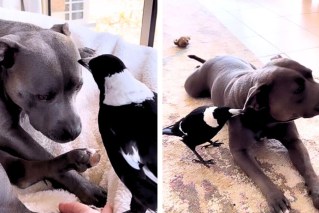Orangutans learn to play video games at Melb Zoo

ABC/Supplied
Orangutans at Melbourne Zoo are playing interactive video games as part of a world-first enrichment program.
Zoos Victoria worked with researchers at the University of Melbourne’s Microsoft Research Centre for Social Natural User Interfaces (NUI) to create the games, which use Kinect 3D technology from Microsoft’s Xbox One gaming system.
The games project images on to the floor of the orangutans’ enclosure, and sense the animals’ movements when they interact with the projections.
• VIDEO: ‘Lamb-pede’ stuns New Zealand woman
• Sausage dog dash a hit with show-goers
• Sickly dugong rescued from cool waters in NSW
Social NUI research fellow Marcus Carter said the idea for the technology was born when researchers found out zookeepers were using painting and musical games on tablets as a form of enrichment for the animals.

Malu has surprised researchers with how quickly he has mastered the games. Photo: University of Melbourne/ABC
“They were really limited in their capacity to interact, the zookeeper had to hold [the tablet] out because the orangutans could probably break it in half,” he said.
“We thought it was terrific, but we also thought we could probably do something better for them.”
The team designed new games using “intelligent projections”, which turns the floor of the enclosure into a touch screen.
“We can detect touches with hands, feet, noses, blankets,” Dr Carter said.
“We have a painting app we haven’t used yet, but if they touch it, it creates a paintbrush, and if they wave their arms over it or roll [over the floor] it creates a different reaction.
“By having a more interesting interface, we’re encouraging them to explore different ways they might want to interact.”
Technology could help orangutans connect with visitors

Researchers say the orangutans are all using the technology in different ways. Photo: University of Melbourne/ABC
Zoos Victoria animal welfare specialist Sally Sherwen said the zoo had six orangutans which would all be involved in the project.
We’ve noticed real differences in their individual uses of it,” she said.
“Malu is a highly intelligent teenaged male and he got the hang of it straight away.
“We have to challenge him even more, building on the games … and we weren’t expecting him to get it that quickly.”
The world-first pilot study began on Monday and will initially run for four weeks.
Dr Sherwen said researchers hoped to build on the program in the future to better tailor it to the animals.
“The real driver is building what we can do for these incredible animals,” she said.
“We wanted to give them something that was more problem-solving based and more mentally challenging for them.”
Dr Carter said he hoped the technology could eventually be developed to allow visitors to interact with the orangutans.
“The reason these guys are in the zoo is because we want people to be able to have a connection with them and do more to protect them in the wild,” he said.
“If we can use technology to make you realise how smart they are, I think that’s really powerful.”
– ABC








